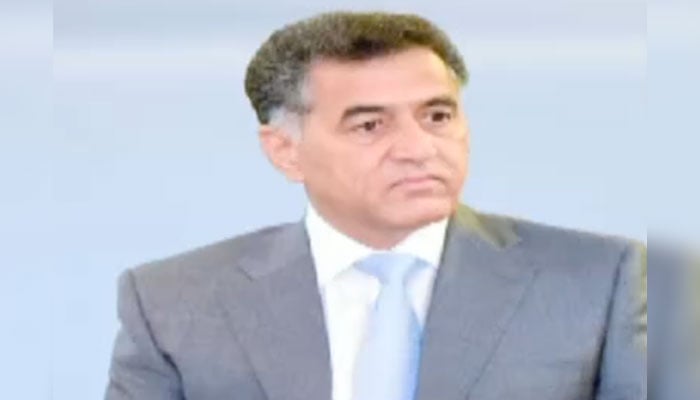Faiz first former ISI chief to face court martial
General Faiz has been charged in connection with a housing scheme scam
LAHORE: Lt Gen (retired) Faiz Hameed is the first former chief of Inter-Services Intelligence (ISI) facing a Field General Court Martial, although a few of his predecessors did remain under the lens for various reasons — a couple of them opting to call it a day prematurely while some sent home before time, research shows.
General Faiz has been charged in connection with a housing scheme scam. During the October 12, 1999 coup, the-then ISI supremo, General Ziaud Din Butt, was arrested along with ousted Premier Nawaz Sharif.
Ziauddin was “appointed” Army Chief by Nawaz Sharif, which triggered the series of events that led to the military coup later that night. He was stripped of his military rank and kept in solitary confinement for two years.
He was subjected to three investigations, and removed from service in 2001. Ziauddin alleged in court that Musharraf confiscated his property and deprived him of his retirement benefits. Another former ISI Chief, Lt. General Asad Durrani, found himself in hot waters after his pension and allowances were withdrawn in February 2019 and he was placed on the Exit Control List (ECL).
He was found guilty of violating the military code of conduct. The 83-year-old General Durrani had co-authored a book ‘The Spy Chronicles’ with a former head of Indian spy agency, Research and Analysis Wing (RAW).
However, in March 2021, the Islamabad High Court had ordered the removal of Durrani’s name from the Exit Control List. Durrani contended in court that inquiry against him had been concluded.
Another spymaster of yore, General (retd) Hameed Gul, was arrested in a crackdown by the General Musharraf-led government on November 4, 2007. By the way, upon taking the reins of Pakistan Army in August 1991, General Asif Nawaz had transferred General Gul, then serving as Corps Commander Multan, as the DG Heavy Industries Taxilla. Hameed Gul refused to take the assignment, an act for which he was retired from the Army.
Days after the 2007 Karachi bombings, Benazir Bhutto (in a letter to President Musharraf) had named Hameed Gul as one of the four persons she had suspected were behind the attempt to kill her. The other three names were Brigadier (retd) Ijaz Shah, Pervaiz Ellahi and Ghulam Arbab Rahim.
Another ex-ISI Chief, General Rizwan Akhtar, announced his pre-mature retirement from the army on Oct 8, 2017, citing “pressing personal commitments.” General Javed Nasir was sacked as ISI Chief by Caretaker Premier, Balkh Sher Mazari, and President Ghulam Ishaq Khan approved his premature retirement in May 1993. He only led the ISI for 13 months.
Media reports suggested various countries had accused General Nasir of supporting the radical movements in their respected countries, and had lodged complaints with the Pakistani government of the time.
Last but not least, another Pakistani superspy, Lt Gen Mehmood Ahmed, was forced to retire from his commission in October 2001 for his alleged involvement financing some extremists abroad. Mehmood vociferously denied charges against him. He was one of General Musharraf’s key confidants during the October 1999 coup against Nawaz Sharif.
However, as far as most recent Court Martials are concerned, Colonel (retired) Akbar Hussain was sentenced to 14 years through Field General Court Martial for inciting sedition in July 2024.
In October 2023, Pakistan Army court-martialed two of its former officers (Adil Raja and Haider Mehdi) for “inciting sedition” and acting against the state’s interests. While Raja was awarded 14 years of rigorous imprisonment, Mehdi was handed down a 12-year prison term.
-
 Belgium Watchdog Launches Antitrust Probe Into Google Ads Business
Belgium Watchdog Launches Antitrust Probe Into Google Ads Business -
 Andrew Ready To Fight Back: 'He's Very Vengeful'
Andrew Ready To Fight Back: 'He's Very Vengeful' -
 After Surpassing 100 Million YouTube Subscribers, BLACKPINK Returns With New Release
After Surpassing 100 Million YouTube Subscribers, BLACKPINK Returns With New Release -
 Rihanna Sends Fans Into Frenzy With BTS Footage Of Music Making: Watch
Rihanna Sends Fans Into Frenzy With BTS Footage Of Music Making: Watch -
 More Americans Say They Sympathise With Palestinians Than Israelis, Poll Finds
More Americans Say They Sympathise With Palestinians Than Israelis, Poll Finds -
 Princess Finally Releases Meghan Markle, Prince Harry's Photos
Princess Finally Releases Meghan Markle, Prince Harry's Photos -
 Victoria Beckham Makes Exciting Announcement Amid Ongoing Rift With Brooklyn Beckham
Victoria Beckham Makes Exciting Announcement Amid Ongoing Rift With Brooklyn Beckham -
 King Charles Receives Major Blow After Meghan Markle, Harry's Trip
King Charles Receives Major Blow After Meghan Markle, Harry's Trip -
 Kate Middleton Apologizes After Her Umbrella Bumps Child's Head
Kate Middleton Apologizes After Her Umbrella Bumps Child's Head -
 Retired US Fighter Pilot Arrested Over Alleged Training Of Chinese Military
Retired US Fighter Pilot Arrested Over Alleged Training Of Chinese Military -
 Why Sarah Ferguson's Next Move Matters?
Why Sarah Ferguson's Next Move Matters? -
 Kris Jenner's Plan For Kylie Jenner To 'seal The Deal' With Timothee Chalamet Unveiled
Kris Jenner's Plan For Kylie Jenner To 'seal The Deal' With Timothee Chalamet Unveiled -
 Kim Kardashian Changes Approach To Dating Amid Lewis Hamilton Romance
Kim Kardashian Changes Approach To Dating Amid Lewis Hamilton Romance -
 Andy Cohen Gets Emotional As He Addresses Mary Cosby's Devastating Personal Loss
Andy Cohen Gets Emotional As He Addresses Mary Cosby's Devastating Personal Loss -
 Andrew Feeling 'betrayed' By King Charles, Delivers Stark Warning
Andrew Feeling 'betrayed' By King Charles, Delivers Stark Warning -
 Andrew Mountbatten's Accuser Comes Up As Hillary Clinton Asked About Daughter's Wedding
Andrew Mountbatten's Accuser Comes Up As Hillary Clinton Asked About Daughter's Wedding




